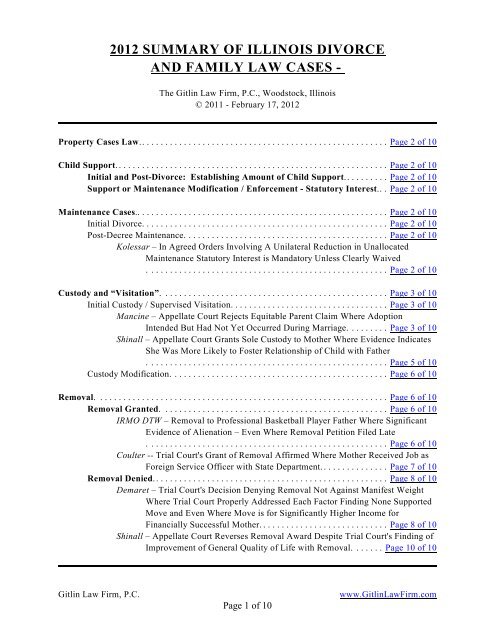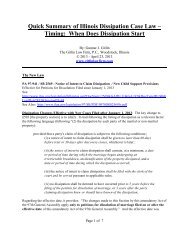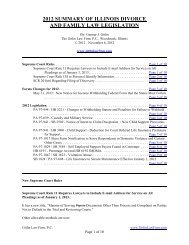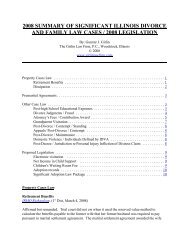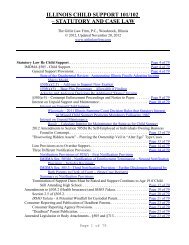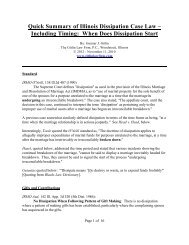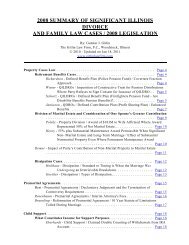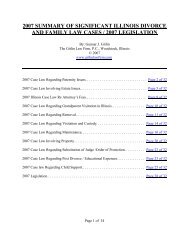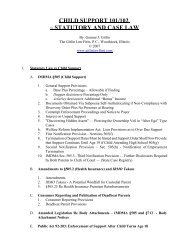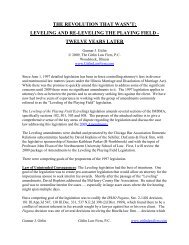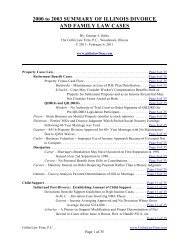Gitlin Law Firm 2010 Illinois Divorce and Paternity Case and ...
Gitlin Law Firm 2010 Illinois Divorce and Paternity Case and ...
Gitlin Law Firm 2010 Illinois Divorce and Paternity Case and ...
Create successful ePaper yourself
Turn your PDF publications into a flip-book with our unique Google optimized e-Paper software.
2012 SUMMARY OF ILLINOIS DIVORCE<br />
AND FAMILY LAW CASES -<br />
The <strong>Gitlin</strong> <strong>Law</strong> <strong>Firm</strong>, P.C., Woodstock, <strong>Illinois</strong><br />
© 2011 - February 17, 2012<br />
Property <strong>Case</strong>s <strong>Law</strong>......................................................Page 2 of 10<br />
Child Support...........................................................Page 2 of 10<br />
Initial <strong>and</strong> Post-<strong>Divorce</strong>: Establishing Amount of Child Support..........Page 2 of 10<br />
Support or Maintenance Modification / Enforcement - Statutory Interest.. . Page 2 of 10<br />
Maintenance <strong>Case</strong>s.......................................................Page 2 of 10<br />
Initial <strong>Divorce</strong>.....................................................Page 2 of 10<br />
Post-Decree Maintenance............................................ Page 2 of 10<br />
Kolessar – In Agreed Orders Involving A Unilateral Reduction in Unallocated<br />
Maintenance Statutory Interest is M<strong>and</strong>atory Unless Clearly Waived<br />
. ...................................................Page 2 of 10<br />
Custody <strong>and</strong> “Visitation”. ................................................Page 3 of 10<br />
Initial Custody / Supervised Visitation. . . . . . . . . . . . . . . . . . . . . . . . . . . . . . . . . . Page 3 of 10<br />
Mancine – Appellate Court Rejects Equitable Parent Claim Where Adoption<br />
Intended But Had Not Yet Occurred During Marriage. . . . . . . . . Page 3 of 10<br />
Shinall – Appellate Court Grants Sole Custody to Mother Where Evidence Indicates<br />
She Was More Likely to Foster Relationship of Child with Father<br />
. ...................................................Page 5 of 10<br />
Custody Modification...............................................Page 6 of 10<br />
Removal. ..............................................................Page 6 of 10<br />
Removal Granted. ................................................Page 6 of 10<br />
IRMO DTW – Removal to Professional Basketball Player Father Where Significant<br />
Evidence of Alienation – Even Where Removal Petition Filed Late<br />
. ...................................................Page 6 of 10<br />
Coulter -- Trial Court's Grant of Removal Affirmed Where Mother Received Job as<br />
Foreign Service Officer with State Department.. . . . . . . . . . . . . . Page 7 of 10<br />
Removal Denied...................................................Page 8 of 10<br />
Demaret – Trial Court's Decision Denying Removal Not Against Manifest Weight<br />
Where Trial Court Properly Addressed Each Factor Finding None Supported<br />
Move <strong>and</strong> Even Where Move is for Significantly Higher Income for<br />
Financially Successful Mother. . . . . . . . . . . . . . . . . . . . . . . . . . . . Page 8 of 10<br />
Shinall – Appellate Court Reverses Removal Award Despite Trial Court's Finding of<br />
Improvement of General Quality of Life with Removal. . . . . . . Page 10 of 10<br />
<strong>Gitlin</strong> <strong>Law</strong> <strong>Firm</strong>, P.C.<br />
Page 1 of 10<br />
www.<strong>Gitlin</strong><strong>Law</strong><strong>Firm</strong>.com
Property <strong>Case</strong>s <strong>Law</strong>:<br />
Child Support<br />
Initial <strong>and</strong> Post-<strong>Divorce</strong>: Establishing Amount of Child Support<br />
Support or Maintenance Modification / Enforcement - Statutory Interest<br />
Maintenance <strong>Case</strong>s<br />
Initial <strong>Divorce</strong><br />
Post-Decree Maintenance:<br />
Kolessar – In Agreed Orders Involving A Unilateral Reduction in Unallocated Maintenance<br />
Statutory Interest is M<strong>and</strong>atory Unless Clearly Waived<br />
IRMO Kolessar <strong>and</strong> Signore, 2012 IL App (1st) 102448 (January 17, 2012)<br />
The key issue in this case involved statutory interest once the former husb<strong>and</strong> unilaterally reductions<br />
of his unallocated maintenance obligation. The former wife urged on appeal that the trial court erred<br />
in finding that the imposition of statutory interest on the arrearages was discretionary, relying on<br />
Finley v. Finley, 81 Ill. 2d 317 (1980). The appellate court first commented:<br />
In <strong>Illinois</strong> Department of Healthcare & Family Services ex rel. Wiszowaty v.<br />
Wiszowaty, 239 Ill. 2d 483 (2011), the supreme court clarified its ruling in Finley,<br />
finding that it "st<strong>and</strong>s for the proposition that, where there are no controlling statutes<br />
defining unpaid support payments as judgments or providing for interest, interest may<br />
be awarded *** as a discretionary matter." (Emphasis in original.) Wiszowaty, 239<br />
Ill. 2d at 489.<br />
To try to distinguish Wiszowaty the former husb<strong>and</strong> pointed out that at issue in this case were agreed<br />
orders:<br />
Such an order represents "a recitation of an agreement between the parties <strong>and</strong> is<br />
subject to the rules of contract interpretation." In re Marriage of Tutor, 2011 IL App<br />
(2d) 100187, 13. They are not "judicial determination[s] of the parties' rights." In re<br />
Haber, 99 Ill. App. 3d 306, 309 (1981). Furthermore, agreed orders are "conclusive<br />
on the parties <strong>and</strong> can be amended or set aside *** only upon a showing that the<br />
order resulted from fraudulent misrepresentation, coercion, incompetence of one of<br />
the parties, gross disparity in the position or capacity of the parties, or newly<br />
discovered evidence." Haber, 99 Ill. App. 3d at 309. Signore argues that the orders<br />
intended to "address <strong>and</strong> finalize" all issues pertaining to his petitions for<br />
modification <strong>and</strong> the fact that they were silent on the issue of interest evidenced the<br />
parties' intent to preclude an interest award.<br />
<strong>Gitlin</strong> <strong>Law</strong> <strong>Firm</strong>, P.C.<br />
Page 2 of 10<br />
www.<strong>Gitlin</strong><strong>Law</strong><strong>Firm</strong>.com
The appellate court rejected this argument <strong>and</strong> stated that the “agreed order, however, must reflect an<br />
'intentional relinquishment' of that right” <strong>and</strong> that “mere silence is not enough.” The appellate court<br />
concluded as to the interest issue:<br />
Here, the agreed orders were silent on the issue of statutory interest pertaining to the<br />
arrearages. Since the Marriage Act requires that interest be paid on orders for child<br />
support, <strong>and</strong> the agreed orders at issue did not contain an explicit waiver by Kolessar<br />
of her right to the statutory interest, the trial court erred in failing to award interest on<br />
the arrearages.<br />
Custody <strong>and</strong> “Visitation”<br />
Initial Custody / Supervised Visitation<br />
Mancine – Appellate Court Rejects Equitable Parent Claim Where Adoption Intended But<br />
Had Not Yet Occurred During Marriage<br />
IRMO Mancine, 2012 IL App (1st) 111138 (February 2, 2012)<br />
The background of the case is unusual. I will quote from the introduction of the case:<br />
Miki <strong>and</strong> Nicholas began dating in the spring of 2008. At that time, Miki was<br />
separated from her then-husb<strong>and</strong>, John Mancine. Miki had a one-year-old adopted<br />
daughter named Elizabeth <strong>and</strong> had begun the process of adopting a second child,<br />
William, <strong>and</strong> was matched with a birth mother. Miki <strong>and</strong> Nicholas decided they<br />
would marry in approximately June or July of 2008. Because Miki had already<br />
started the adoption process of William as a single parent before she met Nicholas,<br />
Miki <strong>and</strong> Nicholas were advised by the adoption agent to finish the process of Miki's<br />
adoption of William, <strong>and</strong> then for Nicholas to adopt William as a stepparent after the<br />
parties' marriage. At the time, Miki <strong>and</strong> Nicholas resided in Wisconsin, where<br />
unmarried couples cannot simultaneously adopt a child. See Wis. Stat. Ann. § 48.82<br />
(West 2008).<br />
4 William was born on August 5, 2008, <strong>and</strong> his birth certificate reflected the name<br />
"William Michael Gansner." In early September 2008, the adoption agent visited<br />
Miki <strong>and</strong> Nicholas to update the home study completed in January 2008 because<br />
Nicholas had moved in with Miki <strong>and</strong> was co-parenting William. Miki's adoption of<br />
William was not yet finalized due to the six-month statutory waiting period. In the<br />
adoption agent's report of February 27, 2009, the agent noted that Miki named<br />
Nicholas as the sole guardian of William <strong>and</strong> any future child she has, <strong>and</strong> named her<br />
parents as alternate guardians. Nicholas took care of William, including diaper<br />
changes <strong>and</strong> feedings. On November 2, 2008, William was baptized. The church<br />
record for the baptism listed William's "parents" as Nicholas <strong>and</strong> Miki. Nicholas <strong>and</strong><br />
Miki became formally engaged in December 2008.<br />
5 William's adoption by Miki as a single adult was finalized in Wisconsin on March<br />
<strong>Gitlin</strong> <strong>Law</strong> <strong>Firm</strong>, P.C.<br />
Page 3 of 10<br />
www.<strong>Gitlin</strong><strong>Law</strong><strong>Firm</strong>.com
4, 2009. The adoption papers identified William as "William Michael Gansner."<br />
Nicholas <strong>and</strong> Miki got married in May 2009. It was both Nicholas' <strong>and</strong> Miki's intent<br />
that Nicholas formally adopt William as a stepparent after their wedding. Miki had<br />
contacted William's adoption agent before their wedding <strong>and</strong> arranged for her to visit<br />
them immediately following the wedding to perform a screening for Nicholas'<br />
adoption of William. In June 2009 the adoption agent performed the stepparent<br />
adoption screening of Nicholas. The agent's report of June 9, 2009, reflected that the<br />
adoption agency intended to support the granting of Nicholas' stepparent adoption<br />
petition. In Nicholas' affidavit in support of his pleadings, he attached an e-mail from<br />
the adoption agent to Nicholas dated August 6, <strong>2010</strong>, informing Nicholas that he was<br />
free to file his stepparent adoption petition, <strong>and</strong> he averred that this is a true <strong>and</strong><br />
correct copy of the e-mail.<br />
6 At that time, Nicholas <strong>and</strong> Miki had already started the process of adopting yet<br />
another child, Henry, <strong>and</strong> were in the process of moving from Wisconsin to Chicago,<br />
<strong>Illinois</strong>, to be closer to Miki's parents. Nicholas alleges that he was under the<br />
impression that he <strong>and</strong> Miki had to assemble a number of documents to accompany<br />
his adoption petition. Later, he learned that he simply had to provide a form petition<br />
<strong>and</strong> include a copy of the order of Miki's adoption of William. Nicholas alleges in<br />
his brief that "[a]s a result of all of these factors, the ministerial act of filing the<br />
stepparent adoption papers just never happened." It is undisputed that respondent<br />
never filed a petition to adopt William.<br />
7 Nicholas <strong>and</strong> Miki moved to Chicago with Elizabeth <strong>and</strong> William. Henry was<br />
born on September 16, 2009. Nicholas alleges that since he was out of work <strong>and</strong><br />
Miki was traveling for her job, he was the primary caretaker of the three children.<br />
Nicholas avers in his affidavit that on August 6, 2009, Miki e-mailed him asking,<br />
"Have you made any progress toward adopting William???? I would like you to take<br />
care of that ASAP," <strong>and</strong> telling Nicholas to "call Carol Gapen from law center for<br />
children <strong>and</strong> families."<br />
8 Nicholas eventually became employed in a full-time position as an assistant<br />
Attorney General for the State of <strong>Illinois</strong>. Nicholas maintains he continued to act as<br />
the three children's primary caretaker <strong>and</strong> took Elizabeth <strong>and</strong> William to day care <strong>and</strong><br />
Henry to Miki's parents' house every morning. In the evenings, Miki's mother <strong>and</strong> a<br />
nanny would pick up the children from day care <strong>and</strong> bring them home to be with<br />
Nicholas. Nicholas was listed as the children's parent at their day care facility.<br />
According to Nicholas, Miki always held out William as Nicholas' child <strong>and</strong> held out<br />
herself, Nicholas, Elizabeth, William <strong>and</strong> Henry as "the Gansner family."<br />
In any event, the wife filed for divorce in Cook County in <strong>2010</strong>. She alleged only one child -- Henry.<br />
The husb<strong>and</strong> filed a response <strong>and</strong> counter-petition seeking sole custody of both children. The wife<br />
countered with a motion to dismiss the claim for custody regarding William based on his lack of<br />
st<strong>and</strong>ing. The trial court granted the wife's §2-619(a)(9) motion to dismiss <strong>and</strong> the appellate court<br />
affirmed. The issue on appeal was whether a non-biological father has st<strong>and</strong>ing to seek custody of a<br />
child he intended to adopt but never formally adopted. The <strong>Illinois</strong> court eventually rejected any<br />
<strong>Gitlin</strong> <strong>Law</strong> <strong>Firm</strong>, P.C.<br />
Page 4 of 10<br />
www.<strong>Gitlin</strong><strong>Law</strong><strong>Firm</strong>.com
“equitable parent” or similar claim of the husb<strong>and</strong> to assert st<strong>and</strong>ing.<br />
The appellate court noted that <strong>Illinois</strong> law:<br />
provides that a custody proceeding may be commenced by a nonparent " 'by filing a<br />
petition for custody of the child in the county in which he is permanently resident or<br />
found, but only if he is not in the physical custody of one of his parents.' " (Emphasis<br />
added.) In re R.L.S., 218 Ill. 2d 428, 434 (2006) (quoting 750 ILCS 5/601(b)(2)<br />
(West 2004)). Our supreme court has interpreted this section as a st<strong>and</strong>ing<br />
requirement for nonparents. In re R.L.S., 218 Ill. 2d at 434-35 (citing In re Custody<br />
of Peterson, 112 Ill. 2d 48, 52 (1986)). " 'St<strong>and</strong>ing' in this context refers to a<br />
statutory requirement the nonparent must meet before the trial court proceeds to the<br />
merits of the petition for custody." In re Custody of M.C.C., 383 Ill. App. 3d 913,<br />
917 (2008) (citing In re R.L.S., 218 Ill. 2d at 436).<br />
Shinall – Appellate Court Grants Sole Custody to Mother Where Evidence Indicates She Was<br />
More Likely to Foster Relationship of Child with Father<br />
Shinall v. Carter, 2012 IL App (3d) 110302 (January 5, 201).<br />
The trial awarded mother sole custody of three-year-old girl. The appellate court ruled that the trial<br />
court did not err in awarding the mother sole custody <strong>and</strong> finding that parents did not have necessary<br />
level of respect for each other to cooperate in child rearing. In this case, the appellate court ruled<br />
that the mother was (awarded sole custody) was more likely to encourage father's relationship with<br />
child than vice versa.<br />
Regarding joint custody the appellate court stated:<br />
In this case, the record shows that Jeremy cooperated with Jessica on major parenting<br />
issues that directly affected Ava, such as support, visitation, <strong>and</strong> where Ava would<br />
reside during the pendency of this case. The majority of Jessica <strong>and</strong> Jeremy's<br />
disagreements consisted of petty bickering that was not much different than any other<br />
parenting couple, whether married or unmarried. On this record, it could be said that<br />
the parents have demonstrated their ability to follow their own oral agreement such<br />
that they similarly would have the "capacity to substantially comply with a Joint<br />
Parenting Order" as required under the language of the joint parenting statute. See<br />
750 ILCS 5/602.1(c)(1)<br />
Nonetheless, the trial court did not abuse its discretion in denying joint custody.<br />
Here, the trial court found that awarding joint custody would not be in Ava's best<br />
interest because the parties did not have the necessary level of respect for each other<br />
to cooperate in Ava's child rearing, as indicated by their friction <strong>and</strong> need for<br />
third-party witnesses at their exchanges. Although Jeremy testified the parties were<br />
able to cooperate, Jessica contradicted Jeremy's testimony with evidence of animosity<br />
that had manifested into disparaging comments being said in front of Ava <strong>and</strong> Ava's<br />
day-care provider quitting to avoid being caught in the middle of the parties' conflict.<br />
We defer to the trial court's findings <strong>and</strong>, as such, cannot say that the trial court's<br />
<strong>Gitlin</strong> <strong>Law</strong> <strong>Firm</strong>, P.C.<br />
Page 5 of 10<br />
www.<strong>Gitlin</strong><strong>Law</strong><strong>Firm</strong>.com
denial of awarding joint custody was against the manifest weight of the evidence.<br />
Regarding sole custody the appellate court case focused on the cooperation factor since other aspects<br />
were quite close:<br />
The court considered the evidence in its proper context <strong>and</strong> determined that most<br />
factors either favored neither party or were not applicable. The trial court properly<br />
focused on the factor of the willingness of each parent to facilitate a relationship<br />
between the minor <strong>and</strong> the other parent. The trial court found that Jessica would be<br />
more likely to encourage a close relationship between Ava <strong>and</strong> Jeremy in light of<br />
Jeremy's animosity toward Jessica <strong>and</strong> the disparaging comments he made about<br />
Jessica in front of Ava. The trial court additionally noted that Jessica had been Ava's<br />
primary caregiver since the parties' separation. IRMO Hefer, 282 Ill. App. 3d 73<br />
(1996) (although there is not a presumption in favor of the existing custodian when<br />
making an 14initial custody determination as there is in modification of custody<br />
cases, a court may consider the period of time a child has spent with a parent under a<br />
temporary custody order).<br />
Essentially, the case was close, as indicated by the trial court, <strong>and</strong> the evidence did<br />
not strongly favor either party. Although the record could support a finding that<br />
Jeremy was more likely to encourage Jessica's relationship with Ava in light of his<br />
testimony stressing the importance of Ava's relationships with himself <strong>and</strong> Jessica as<br />
her parents <strong>and</strong> in light of Jessica's instructing Ava to call Nate "daddy," we must<br />
defer to the trial court's findings. As such, we affirm the trial court's decision to<br />
award Jessica sole custody.<br />
Custody Modification<br />
Removal<br />
Removal Granted<br />
IRMO DTW – Removal to Professional Basketball Player Father Where Significant Evidence<br />
of Alienation – Even Where Removal Petition Filed Late<br />
IRMO D.T.W <strong>and</strong> S.L.W., 2011 IL App (1st) 111225 (December 30, 2011)<br />
DTW involves a professional basketball player awarded custody <strong>and</strong> granted leave to remove the<br />
child to Florida. For professional basketball fans, we all know who this case involved: a native son<br />
who chose not to sign with the Chicago Bulls.<br />
Alienation: This case involves an award of custody against what was the primary caretaker of the<br />
children. The discussion regarding alienation is significant because it affected the removal decision:<br />
Contrary to respondent's argument, the record shows that her alienating behavior<br />
worsened during the two-year course of the custody proceeding. The record also<br />
shows that respondent had ample opportunity to comply with Doctor Amabile's<br />
<strong>Gitlin</strong> <strong>Law</strong> <strong>Firm</strong>, P.C.<br />
Page 6 of 10<br />
www.<strong>Gitlin</strong><strong>Law</strong><strong>Firm</strong>.com
ecommendations to seek counseling but failed to do so.<br />
Perhaps the most remarkable portion of the decision addressed the trial court's granting leave to<br />
remove from <strong>Illinois</strong> to Florida:<br />
Respondent claims the court erred in prompting <strong>and</strong> allowing D.T. to a file a petition<br />
for removal after he had rested his case. In the alternative, respondent maintains the<br />
court erred in granting D.T.'s petition.<br />
Coulter -- Trial Court's Grant of Removal Affirmed Where Mother Received Job as Foreign<br />
Service Officer with State Department<br />
IRMO Coulter, 2012 IL App (3d) 100973, (January 13, 2012)<br />
The trial court's decision granting mother's petition for removal of her nine-year-old daughter, after<br />
the mother obtained employment as a foreign service officer for State Department, was not against<br />
the manifest weight of the evidence. The mother would have two-thirds overseas posts <strong>and</strong> one-third<br />
posts in Washington, D.C. The posts would last for two to three years, with transitions typically<br />
occurring in summers. The appellate court noted the trial court's findings that the move of mother<br />
would greatly enhance quality of life for mother <strong>and</strong> child. The trial court's decision stated, “The<br />
economic, social, educational <strong>and</strong> cultural opportunities afforded by [Melissa's] achievement of<br />
obtaining a position with the United States State Department as a Foreign Service Officer cannot be<br />
understated."<br />
The mother attached to the petition data sheets reported that the schools in Virginia or with<br />
American students in overseas schools had better SAT schools than the national average. More<br />
importantly, she attached a proposed parenting agreement to her petition. It proposed 10 weeks<br />
visitation to the father during the summer (basically the entire summer except two weeks).<br />
Transportation costs would be covered by the State Department. The mother proposed that she<br />
would assume responsibility to ensure that the children were chaperoned during travel from [her]<br />
residence to [Donald's] residence. There was also a proposal regarding extended spring break <strong>and</strong><br />
Christmas break. The proposed agreement provided that the mother would provide the daughter<br />
with a computer <strong>and</strong> Internet access so Donald could communicate with her via webcam <strong>and</strong> e-mail.<br />
The agreement provided that the mother would pay the cost for school (actually the portion not<br />
covered by the State Department).<br />
Curiously, at the time of the removal hearing the mother had been working in Washington D.C. <strong>and</strong><br />
had been living in Virginia. In any event, best viewed this case can be viewed as one where the<br />
appellate court simply affirmed the rulings of the trial court. Recall that the st<strong>and</strong>ard is manifest<br />
weight. To reverse the appellate court needed to find that the trial court's findings were against the<br />
manifest weight of the evidence. Thus, the appellate court concluded:<br />
This is undoubtedly a difficult case, as the removal significantly decreases Donald's<br />
visitation time. Nevertheless, under the circumstances of this particular case, we<br />
cannot say that the circuit court's findings on the relevant factors were against the<br />
manifest weight of the evidence. See, e.g., R.M.F., 275 Ill. App. 3d at 48 ("[t]he<br />
presumption in favor of the trial court's decision is compelling in such cases <strong>and</strong><br />
<strong>Gitlin</strong> <strong>Law</strong> <strong>Firm</strong>, P.C.<br />
Page 7 of 10<br />
www.<strong>Gitlin</strong><strong>Law</strong><strong>Firm</strong>.com
should not be disturbed merely because we might arrive at a different conclusion").<br />
Removal Denied<br />
Demaret – Trial Court's Decision Denying Removal Not Against Manifest Weight Where Trial<br />
Court Properly Addressed Each Factor Finding None Supported Move <strong>and</strong> Even Where Move<br />
is for Significantly Higher Income for Financially Successful Mother<br />
IRMO Demaret, 2012 IL App (1st) 111916 (January 27, 2012)<br />
In this case the 2006 divorce judgment incorporating the parenting agreement awarded the wife sole<br />
custody of the parties' four children. The father received parenting time alternate weekends <strong>and</strong> one<br />
evening per week. He also had a right of first refusal when the mother was out of town for work. At<br />
the time of the divorce the mother expressed concerns regarding the father's alcohol consumption.<br />
The parenting agreement contained provisions regarding the father's alcohol use during his parenting<br />
time. In July <strong>2010</strong> the mother filed a petition for removal seeking to move the children to New<br />
Jersey.<br />
From 2001 until July <strong>2010</strong>, the former wife (Elizabeth) worked for Arthur J. Gallagher (Gallagher),<br />
servicing clients in their international operations. In 2007, her gross income was $266,933; in 2008,<br />
she earned $293,176; <strong>and</strong> in 2009, she earned $263,263. Her job required her to travel periodically,<br />
both within the country <strong>and</strong> internationally.<br />
The appellate court then summarized the Elizabeth's next choices:<br />
In December 2009, Elizabeth began exploring an employment lead with Marsh, a<br />
company located in New York. Elizabeth knew that accepting a job with Marsh<br />
would require that she relocate to the New York area. In June <strong>2010</strong>, Elizabeth<br />
executed an employment contract with Marsh. She would begin with a gross salary<br />
base of $245,000, which would increase to $275,000 upon relocating to the New<br />
York area. She would also receive a minimum of $125,000 in a guaranteed bonus<br />
<strong>and</strong> $75,000 in stock options. According to Elizabeth's testimony, her annual salary<br />
would be a minimum of $475,000, with the possibility of additional bonuses. After<br />
signing the contract with Marsh, Elizabeth informed James of her new employment<br />
<strong>and</strong> her intent to move to New Jersey with the children. She resigned from her job at<br />
Gallagher.<br />
In addition to earning more money at Marsh, Elizabeth would be required to travel<br />
less than when she worked at Gallagher. Work-related travel would be on a "need<br />
driven" basis. While at Gallagher, Elizabeth traveled 30 to 35 times per year. At Marsh,<br />
she would travel less often, but her travel would more frequently take her out of the<br />
country. Marsh also provided better medical benefits with lower out-of-pocket expenses.<br />
Her commute from her anticipated home in Middleton to New York City would be<br />
shorter than her Chicago-area commute to Gallagher by approximately 10 minutes.<br />
According to Elizabeth, the shorter commute time <strong>and</strong> reduced travel would give her<br />
more time at home with the children.<br />
Other factors of interest were the fact that Elizabeth had extended family on the east coast since her<br />
<strong>Gitlin</strong> <strong>Law</strong> <strong>Firm</strong>, P.C.<br />
Page 8 of 10<br />
www.<strong>Gitlin</strong><strong>Law</strong><strong>Firm</strong>.com
parents lived five miles from Middleton, <strong>and</strong> her sister lived in D.C. The appellate court stated:<br />
In New Jersey, the children would have a nanny or Elizabeth's mother would take<br />
care of them when Elizabeth could not be home. In <strong>Illinois</strong>, the children have a<br />
nanny <strong>and</strong> at times Elizabeth's mother flies in to stay with the children when<br />
Elizabeth travels. James also cares for the children in accordance with his right of<br />
first refusal.<br />
The former wife pointed out that flights to Newark leave essentially ever hour <strong>and</strong> are quite<br />
affordable – about $225 for a round trip ticket at the time of trial on removal. She offered to pay her<br />
former husb<strong>and</strong> $5,000 annually for travel expenses. She envisioned a schedule for parenting time<br />
similar to the current schedule but granting the father longer blocks of time. She envisioned her<br />
former husb<strong>and</strong> flying to New Jersey on various alternating weekends <strong>and</strong> staying with Elizabeth's<br />
parent's home – who had a separate apartment contained within the building structure of their house.<br />
There were many other significant facts in this decision.<br />
I liked the appellate court's quote from Collingbourne summarizing the balancing of the Eckert<br />
factors:<br />
In assessing best interests, the circuit court should keep in mind two salient<br />
considerations. First, "a child has an important interest in 'maintaining significant<br />
contact with both parents following the divorce.' " Id. at 522 (quoting Eckert, 119 Ill.<br />
2d at 325). Second, the quality of a child's life may be enhanced from the child's<br />
experience "stemming from the [custodial] parent's life enhancement."<br />
Regarding the manifest weight st<strong>and</strong>ard the decision stated:<br />
A circuit court's decision on removal is entitled to substantial deference because the<br />
judge, as trier of fact, directly observes the parties from which he or she can "<br />
'evaluate their temperaments, personalities, <strong>and</strong> capabilities.' " Eckert, 119 Ill. 2d at<br />
330 (quoting Gallagher v. Gallagher, 60 Ill. App. 3d 26, 31-32 (1978)). A court of<br />
review will reverse only if the appealing party can demonstrate that the decision is<br />
against the manifest weight of the evidence such that the ruling constitutes a manifest<br />
injustice. Eckert, 119 Ill. 2d at 328. "A decision is against the manifest weight of the<br />
evidence where the opposite conclusion is clearly evident or where the court's<br />
findings are unreasonable, arbitrary, <strong>and</strong> not based on any of the evidence." In re<br />
Marriage of Matchen, 372 Ill. App. 3d 937, 946 (2007) (citing In re Marriage of<br />
Main, 361 Ill. App. 3d 983, 989 (2005)). (Emphasis added.)<br />
The appellate court then reviewed each Eckert factor <strong>and</strong> ultimately ruled that the decision was not<br />
against the manifest weight of the evidence.<br />
Recall what I have referred to as my “economic necessity” article regarding removal <strong>and</strong> the general<br />
quality of life factor. The appellate court stated:<br />
The trial judge characterized Elizabeth's claim of additional savings for college<br />
<strong>Gitlin</strong> <strong>Law</strong> <strong>Firm</strong>, P.C.<br />
Page 9 of 10<br />
www.<strong>Gitlin</strong><strong>Law</strong><strong>Firm</strong>.com
expenses based on her increased salary as "self-serving" given that Elizabeth earned a<br />
substantial salary while at Gallagher. Elizabeth argues that she is the sole source of<br />
financial support for the children as James makes only small contributions; even if<br />
this is true, she has not shown that she was unable to support her children during her<br />
employment at Gallagher. In other words, leaving her job in pursuit of more money<br />
for the children was not a necessity. Although the trial judge's statement that<br />
Elizabeth's most recent gross income at Gallagher of $263,000 is "substantially<br />
similar" to her base earnings of $475,000 at Marsh is questionable, the trial judge<br />
reasonably concluded that a higher salary alone is not enough to favor removal on<br />
the first factor.<br />
Shinall – Appellate Court Reverses Removal Award Despite Trial Court's Finding of<br />
Improvement of General Quality of Life with Removal<br />
Shinall v. Carter, 2012 IL App (3d) 110302 (January 5, 201).<br />
The trial awarded mother sole custody of three-year-old girl, <strong>and</strong> granted the mother's petition for<br />
removal of child from <strong>Illinois</strong> to Colorado, where her new husb<strong>and</strong> lived. The appellate court ruled<br />
that the trial court erred in allowing removal determining that the trial court's finding that child's<br />
quality of life would improve by having a stay-at-home mother was not supported by the evidence.<br />
The Third District appellate court held that the removal would have drastic adverse effect on father's<br />
visitation, would substantially alter father-child bond, <strong>and</strong> would deprive child of stable home<br />
environment. Shinall noted that the Eckert factors are not exclusive <strong>and</strong> other factors to consider<br />
were that the mother's history of relationships indicated a tendency toward impulsivity. And the<br />
mother <strong>and</strong> her husb<strong>and</strong> had not yet established a marital home together. On the other h<strong>and</strong>, the<br />
appellate court ruled that the trial court did not err in awarding the mother sole custody <strong>and</strong> finding<br />
that parents did not have necessary level of respect for each other to cooperate in child rearing. In<br />
this case, the appellate court ruled that the mother was (awarded sole custody) was more likely to<br />
encourage father's relationship with child than vice versa.<br />
The <strong>Gitlin</strong> <strong>Law</strong> <strong>Firm</strong>, P.C., provides the above information as a service to other lawyers. A<br />
person's accessing the information contained in this web site, is not considered as retaining The<br />
<strong>Gitlin</strong> <strong>Law</strong> <strong>Firm</strong>, P.C., for any case nor is it considered as providing legal advice.<br />
Gunnar J. <strong>Gitlin</strong><br />
The <strong>Gitlin</strong> <strong>Law</strong> <strong>Firm</strong>, P.C.<br />
663 East Calhoun Street<br />
Woodstock, IL 60098<br />
815-338-9401<br />
815-338-9403<br />
© 2012<br />
G:\Docs\<strong>Case</strong> <strong>Law</strong> Update 2012a.wpd<br />
Last Updated on: February 17, 2012<br />
<strong>Gitlin</strong> <strong>Law</strong> <strong>Firm</strong>, P.C.<br />
Page 10 of 10<br />
www.<strong>Gitlin</strong><strong>Law</strong><strong>Firm</strong>.com


